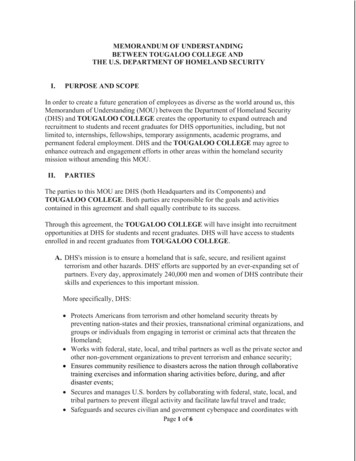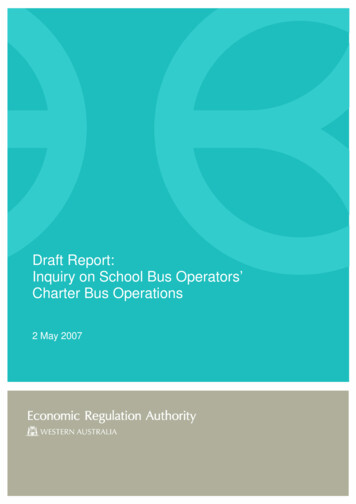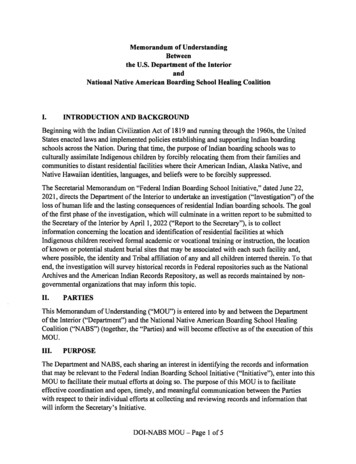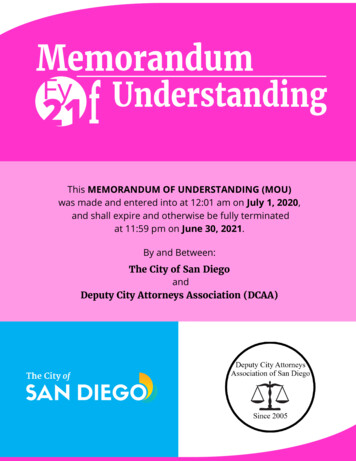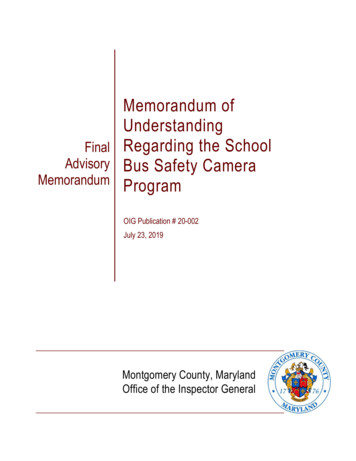
Transcription
Memorandum ofUnderstandingFinal Regarding the SchoolAdvisory Bus Safety CameraMemorandum ProgramOIG Publication # 20-002July 23, 2019Montgomery County, MarylandOffice of the Inspector General
OFFICE OF THE INSPECTOR GENERALFINAL ADVISORY MEMORANDUMJune 28, 2019TO:Andrew W. KleineChief Administrative OfficerFROM:Edward L. Blansitt IIIInspector GeneralSUBJECT:Memorandum of Understanding Regarding the School Bus SafetyCamera ProgramOIG Publication #20-002I.Introduction and Summary of FindingsIn August of 2018, the OIG learned a local news reporter asked the Montgomery CountyGovernment (MCG) about possible contractual connections between MCG and ForceMultiplier Solutions, Inc. (FMS)1. These inquiries were based on reports about the convictionof the FMS Chief Executive Officer (CEO) of federal crimes involving fraud and bribery ofpublic officials in Texas regarding the operation of a school bus safety camera program. Thiscompany and its successor have operated the same program in Montgomery County (County).2Although the contract is with the Montgomery County Public School System (MCPS),Montgomery County Police Department (MCPD) employees appear to have extensivelyparticipated in contract negotiations and then signed a Memorandum of Understanding (MOU)between MCPS and the County (through the County Police Department). This MOU appearsto obligate the County to certain requirements as described in the MCPS contract.There is no information suggesting that any County or MCPS employee violated a rule, law, orprocedure, had any inappropriate relationship with the vendor or that the County, MCPD, orMCPS is connected to any of the events in Texas. We support the MCPD and MCPS expressedgoals of increasing public and student safety but remain concerned about the use of an MOUand the effectiveness of County procurement and administrative process controls. We alsoquestion whether an appropriate business case3 was presented supporting County involvement123For consistency “FMS” will be used throughout this document to refer to Force Multiplier Solutions.This program is referred to in Montgomery County as the “School Bus Safety Camera Program.”In this context, a business case is the identification and analysis of a problem and the development of an effective,reasonable, and feasible plan to reach the desired outcome. Herman, B. & Siegelaub, J. M. (2009). Is this really worth
Andrew W. KleineJune 28, 2019Page 2in this MOU/contract and if a proper re-assessment was made once serious issues involving theselected vendor came to be known.We recommend that financial transactions and obligations related to agreements be subjectedto an objective business case analysis to protect the interests of the County and its residents andensure that the County pays a fair price for necessary, quality products and services. We alsorecommend that comprehensive due diligence re-assessments be undertaken, independent ofthe Department or Agency involved, when adverse information becomes known about a vendor,contract, or program, with which the County is associated.II.BackgroundIn June 2016, MCPS entered into a contract with FMS to provide a School Bus Safety CameraProgram in Montgomery County. Although MCG is not a direct party to the MCPS contract,an MOU exists between MCG and MCPS under which the County assumes certain contractualresponsibilities. These include: (1) MCPD review and evaluation of possible violations, (2)collecting and processing fines under a process substantially the same as the one used by theMCPD Automated Traffic Enforcement Unit for red light and speed camera violations, and (3)making supplemental appropriations to MCPS for payments to FMS based on the anticipatedticket revenue. MCPD indicated its intention to use the 250,000 included in the fiscal year(FY) 2017 budget for the school bus camera contract to fund three new employees to process alarger than expected number of tickets. Based on this statement, from the inception of thiscontract, we estimate that the County has spent approximately 750,000 from its operatingbudget for additional MCPD positions related to this program.4 Although over 10 million ofticket revenue has been transferred to the vendor, neither the County nor MCPS (based on thecontract) has received any ticket proceeds from this program.In 2018 the CEO of FMS (Robert Leonard), a non-FMS business associate, the Dallas CountySchools Superintendent (Rick Sorrells), and the Mayor Pro Tem of Dallas (Dwaine Caraway)all pleaded guilty to crimes involving bribes and kick-backs paid to public officials in Dallasin exchange for favorable actions furthering FMS’ local business interests. These interestsmainly involved the implementation and operation of a School Bus Stop Light Cameraenforcement program.5 Mr. Leonard was sentenced in May of 2019 to serve seven years inprison for what federal prosecutors described as “the largest domestic public corruption case inhistory.”6456the effort? The need for a business case. Paper presented at PMI Global Congress 2009—North America, Orlando, FL.Newtown Square, PA: Project Management Institute. -case6730 (accessed June 18, 2019).MCPD stated that 250,000 in FY 2017 was appropriated for three new positions.According to a press release from the United States Attorney’s Office in the Northern District of Texas dated August Scandal509933161.html?amp y (accessed May 15, 2019).
Andrew W. KleineJune 28, 2019Page 3In October 2017, MCPS signed an amended contract and MOU with MCPD, acknowledgingthe assignment of the FMS contract to what was described as a separate company namedBusPatrol America LLC (BusPatrol).III.Inquiry and OutcomesWe initially contacted the MCPS Chief Operating Officer (MCPS COO) to obtain generalinformation and to determine which departments of MCG were involved in this program. Heindicated that the School Bus Safety Camera Program was brought to MCPS by the MCPD asa traffic enforcement initiative; but the contract was between MCPS and FMS. He emphasizedthat MCPS is always concerned about student and pedestrian safety and indicated a significantinterest in the added benefit of having access to a system providing surveillance cameras insidethe buses.The MCPS COO clarified that MCPS is a willing partner in the program and not just a thirdparty to the program. He expressed support, without reservation, about the program despitethe program/company affiliation with the former CEO of FMS who was recently sentenced toseven years in prison and ordered to pay 125 million in restitution for his involvement in theconspiracy.We learned that on behalf of MCG, the MCPD signed an MOU with MCPS accepting certainresponsibilities under the contract. Responses to our draft report, provided by MCPS, suggestthis contract/MOU relationship was considered necessary by both parties due to the respectiveresponsibilities and requirements of MCPS, FMS, and MCPD regarding the program.Additionally, those responses demonstrate that even though this was a “Bridge” 7 contractbetween MCPS and FMS, the terms, product, and services were extensively negotiated over asignificant period. MCPD staff told us that they actively participated in those negotiations.We learned that MCPD contacted and consulted various other departments and offices in theCounty government, but those offices largely declined to get involved or had minimalinvolvement since the contract was between MCPS and FMS.8 The exception to this was theinvolvement of the Office of County Attorney. Information provided to us gives the impressionthat, since the millions of dollars generated and transferred to the vendor were not tax revenueor subject to County budget processes and controls, the normal County offices responsible forthose activities did not have the mandate to intervene.78Bridging is a process where a governmental entity participates in an existing competitively bid contract in place withanother public entity.These included the County Finance Department and Office of Procurement.
Andrew W. KleineJune 28, 2019Page 4Finding 1: The business case for this program was built around the desired use of a predeterminedvendor rather than an objective analysis to design an effective and economical method toachieve an identified outcome.a. The MOU and the MCPS Bridge ContractLarge contracts awarded by MCPS typically require the utilization of public biddingprocedures. This protects the integrity of the decision process and ensures the best value forthe County. An exception to this requirement is outlined within the Maryland Education ArticleSection 5-112 and restated in the MCPS procurement policy, indicating that MCPS may“participate” in contracts issued by other public agencies “if the lead agency for the contractfollows public bidding procedures.”9 (Participation in another contract is hereafter referred toas a “bridge contract”.) According to the contract and the MOU, “MCPS is participating in anexisting contract awarded under RFP 22-10 – School Bus Safety Program, from the East BatonRouge Parish School Board.”Bridge contracts do not go through the normal procurement channels and provide an expeditedmanner to engage in contracting. According to the MCPS Procurement Manual, a bridgecontract involves participation in the same contract competed by a different public agency.10According to the Maryland Office of State Audits, interpretations of the rules and lawsapplicable to the school system would be guided by the principle that better terms areacceptable.11In this case, MCPS bridged/participated in a contract that was originally awarded by the EastBaton Rouge Parish School Board (EBRPSB)12 in Louisiana to a company called BusGuard in2011.13 Documents indicate that the name of the company was later changed from BusGuardto Force Multiplier Solutions and an extension of the contract term was made to 2021. Inresponse to our inquires for information about this contract, EBRPSB provided conflictingaccounts about whether any work was performed on this contract after 2015/2016 and expressedsignificant reservations about the vendor (FMS). However, EBRPSB indicated support for theprogram itself.Based on our review of the contracts, the contract bridged by MCPS appears to have termsmore favorable to EBRPSB than MCPS received under its contract with FMS. Although theprograms appear similar, the EBRPSB program is structured quite differently and resulted inimmediate ticket revenue for both EBRPSB and the East Baton Rouge Sheriff’s Office. Under910111213MCG is also authorized to enter into bridge contracts, subject to certain requirements, under Montgomery County CodeSec. 11B-42.MCPS Procurement Manual Sec. 1 p. 2; Sec. 20, p.28.Maryland State Finance and Procurement Code Ann. Sec. 13-110 and COMAR 21.05.09.04 suggest that better terms areacceptable by describing the purposes of these types of contracts as providing cost benefits to the State; promotion ofadministrative efficiencies; promote intergovernmental cooperation; is in the best interest of the State; and does notintend to evade procurement rules contained in another section of the Code and under COMAR.For readability in the context of this document, the East Baton Rouge Parish School District, East Baton Rouge SchoolSystem, and The East Baton Rouge Parish School Board will collectively be referred to by the acronym "EBRPSB".Issues related to the underlying contract and its use for bridging are governed by MCPS procurement rules and beyondthe scope of this document.
Andrew W. KleineJune 28, 2019Page 5the MCPS contract, FMS retains all ticket revenues until the contractor recoups its investmentcosts (estimated at approximately 18 million). It remains unclear whether MCG or MCPSwill receive any citation revenue in the future. In contrast, the EBRPSB contract is explicitabout the fee sharing agreement and who receives citation revenue.MCPS expressed the opinion that the terms that it negotiated are at least equivalent to andlikely more favorable than those in the EBRPSB contract that was bridged. We were told ofextensive negotiations involving technical requirements, prices per camera, revenue sharingamounts and timing of those payments, by whom and how ticket revenue is processed forcollection, and the number and location of camera units deployed. We note that the MCPScontract includes internal audio and visual surveillance unrelated to stop arm enforcement.MCPS further explained that there was no reasonable way, given budget constraints, to outfitthe large fleet of MCPS school buses in the time frame, with significant benefits to student andpublic safety without structuring the contract this way.While we appreciate the position of MCPS and recognize the extensive contract negotiationsconducted by the County and MCPS, those negotiations are a reason we remain skeptical ofthe efficiency and value to the State (an implied requirement under state law) 14 in using thisbridge contract/MOU arrangement. These activities appear to be the types of administrativeburdens that the bridging process is intended to alleviate. At the same time, the use of thebridged contract in this instance forgoes the benefits achieved through a competitive biddingprocess.We found additional concerns in the wording of the MCPS contract, which requires the County“to remit 100% of Fines received . . . until such time that the Contractor recovers the costs ofits initial and ongoing capital investment . . .” (emphasis added),15 at which point FMS will becompensated under a revenue sharing agreement which is to be negotiated during the term ofthe contract. 16 The contract reveals that “Cost of Investment Estimate”, includes up to“ 1,000,000” per year in “operating costs.” Under the terms of the contract it appears that theseoperating costs are defined in the contract to include the following: 17a)b)c)d)e)f)14151617repair and replacement of camerascitation preparation and mailingpayment processingtrainingongoing costs related to maintenance on contractor vehiclesongoing costs related to contractor officesSee footnote 11.Section X (B) MCPS Bus Contract with Force Management Solutions signed June 30, 2016.The contract states that the parties will “enter into negotiations to determine a revenue sharing plan to take effect oncethe Contractor has recovered its Cost of Investment” which is to be finalized within “the 24th month after the date firstabove written.” At the time of our review it had not been agreed on. The contract does include a stipulation that theparties may extend the period of negotiations through a mutual agreement in writing.Section X (B) 1 (c) MCPS Bus Contract with Force Management Solutions signed June 30, 2016.
Andrew W. KleineJune 28, 2019Page 6g) Contract management costs1. costs for program management and leadership personnel2. undefined travel and document retentionBecause the “Cost of Investment” described in this contract includes ongoing operating costs,it is possible that it may never be fully recovered by the contractor, and this 1 million a yearfee may be on top of any revenue splitting agreement that may be reached.It is also not clear whether MCPS will obtain ownership of the camera system for which it haspaid.18 The contract states that upon contract termination, FMS is responsible for the removalof the equipment. The recitals section of the contract states that the contract is to “install,operate, and maintain certain equipment”. It appears the referenced equipment is the“BusGuard system ” which is comprised of all the hardware (cameras) and its associatedsoftware,19 but no clear indication was found as to who really owns the equipment. This pointwas also reported as a significant source of contention in the FMS-Dallas County Schools civilcourt case.20Based on the totality of the circumstances, supported by the wording of an MCPD memo datedSeptember 2015, it appears that essentially a sole source vendor was identified, and the MCPSprocurement/bridging process was used to develop the contract after most of the significantterms of the contract were re-negotiated by MCPD and MCPS. This contract was then linkedto the County via an MOU signed at the MCG departmental level.One significant impression resulting from our analysis of the facts associated with this situationwas that despite this program generating well over 10 million in revenue (to date) for thevendor, the MOU was not subjected to prudent procedural considerations by MCG. Thisappears to arise from the concept presented by the MCPD and MCPS to members of the CountyCouncil that because these funds came directly from traffic violations assessed to countyresidents and drivers, rather than from the operating budget of a County agency or department,the program comes at “No Cost” to the County.We note that regardless whether the revenue comes from taxes or citations, the source of thosefunds is largely the same: County residents and taxpayers. The County should exercise goodstewardship of those funds and ensure that purchases are reasonable and necessary, and thebest products and services are received for the best price.b. The Cost to the CountyCouncil Committee members were told, on multiple occasions, that the MCPS camera programcomes at no cost to the County. On July 11, 2016, in support of the initial contract, information181920The Cost of Investment subsection of the contract states that the 18,974,246 value of the contract includes “BusGuard System equipment and hardware; at 9,758.00 per school bus” with an additional “ 1,100.00 per school bus” forinstallation of the BusGuard System.We found information that in 2014, school bus stop light enforcement camera systems could be purchased for under 2,000 per bus. This suggests that the costs for the system provided by FMS (described in footnote 8) are likely relatedto the other cameras and audio devices installed by -in-dark-as-bus-camera-company-closes/ (accessed May 24, 2019).
Andrew W. KleineJune 28, 2019Page 7provided to the Council Public Safety and Education Committees by MCPD stated that FMSwould absorb all the cost to outfit the entire MCPS bus fleet at no cost to the County or MCPS.The program, and FMS investment in start-up costs of up to 18 million to outfit the 1200 busfleet, was repeatedly characterized as “too good to be true.” 21 Councilmembers presentexpressed appropriate skepticism at both the cost and the business model presented during theinitial presentation and requested additional supporting data. We are not aware of whatadditional information may have been provided.During early program presentations to the Council Public Safety and Education Committees, itwas made clear that as a condition of the contract, the County Government (MCG) would berequired to fund several new staff positions to review citations issued under the program. AJuly 7, 2016 memo jointly addressed to the Public Safety and Education Committees states that“MCPD plans to use the 250,000 included in the FY 2017 budget for the school bus cameracontract to fund three new employees needed to process the larger expected volume of tickets.”However, at a more recent Education Committee and Public Safety work session it was againsuggested that the program comes at no cost to the County. So far, Montgomery County hasspent over 750,000 from its operating budget to enable the vendor to recover what the contractdefines as the vendor’s costs of investment.We note, in comparison, that under the EBRPSB contract, the immediate revenue streamgenerated by violator fines could cover or exceed the costs to EBRPSB with no additionalexpenditures required from EBRPSB. In the EBRPSB contract, BusGuard (FMS) retainsownership of the cameras and equipment used and is responsible for all costs associated withthe installation and administration of the camera program. It does not appear this is the case inthe MCPS contract. East Baton Rouge law enforcement continues to review and approvecitations; however, ticket revenues are split 70% (BusGuard)/ 20% (EBRPSB)/ 10% (Sheriff’sOffice) immediately.Vendor supplied information from the five-month pilot program, provided to the Council PublicSafety and Education Committees, does not address any improvement in student or pedestriansafety or collision reduction. However, the documents do address routes with the highestnumber of violations which logically translate to the highest revenue production. Additionaldata provided by the vendor does not document reductions in total violations but does providemeasurements of the reduction in recidivist violators.Data supplied by MCPS indicates that during the term of this contract, violation rates haveremained relatively steady and in one year slightly increased. We contacted both MCPD andthe Maryland State Police and requested data on school bus stop light violations resulting inpedestrian collisions in Montgomery County; neither agency could locate any record of such acollision in Montgomery County for at least the past eight years.According to legal counsel for the Dissolution Committee for the Former Board of Trustees ofDallas County Schools, “The Stop Arm Camera Program suffered consistent losses during thefiscal years from 2012 to 2016, and independent forensic accountants determined that the Stop21This quote is from the legislative document package presented July 7, 2016 to the Council Public Safety and EducationCommittees in support of this program.
Andrew W. KleineJune 28, 2019Page 8Arm Camera Program would not be effective as it was structured.” This was during the sametime period that an FMS supplied “customer” (actually a co-conspirator, the Dallas CountySchools Superintendent) verified the success of the program to MCG and MCPS officials.Although we have not undertaken a forensic accounting review of the MCPS program, itappears to be structured much like the Dallas County School District program which ultimatelyled to the bankruptcy of the school district. Much like the situation in Dallas County,Montgomery County appears to potentially bear the financial burden of vendor failure.Our review also noted that the revenue sharing agreement with the vendor has not yet beenreached and any revenue split between MCPS and MCG is not yet settled. It is unclear to uswhen, or even if, the County will recover its investment in this program or what happens to anyrevenue stream after that point. Audits and additional research need to be done on this issue,but it appears that this is not a “no cost” program to the County, even if it is a no cost programto MCPS. Finally, performance measures used in proposals and provided in supplementalmaterials to the Council Public Safety and Education Committees do not seem to have anymeasurable impact on or correlation with improvements in pedestrian or traffic safety orcollision reduction.Recommendation 1All agreements involving financial transactions, regardless of the source of the funds,should be subjected to a documented objective business case analysis to protect theinterests of the County and its residents and ensure that the County pays a fair price fornecessary, quality products and services. Programs should have measurable outcomesand objectives.
Andrew W. KleineJune 28, 2019Page 9Finding 2: County officials relied, at least in part, on information provided by a criminal conspirator invetting FMS and this program, and they continued to rely on vendor (FMS/BusPatrol)supplied information when considering the future of the program.In August 2015, prior to entering into the bridge contract, MCPS and MCPD officials traveledto Dallas, Texas to meet with FMS officials to “get a first-hand look at their product andoperation”.22 During that trip, the former president and chief operating officer of FMS, who iscurrently the president of BusPatrol, introduced MCPS and MCPD officials to the DallasCounty Schools Superintendent “to get feedback on the product and the safety program.” TheDallas County Schools Superintendent subsequently pleaded guilty to receiving bribesregarding the operation of this program in Dallas. In deciding to contract with FMS, MCPSand MCG appear to have relied upon information provided by the Dallas County SchoolsSuperintendent who, unknown to MCPD and MCPS, was actively accepting bribes from FMSwhile recommending the program.23Based on comments made during testimony before the Council Education Committee onSeptember 27, 2018, it appears that even after significant adverse information came to light,MCG and MCPS may have continued to rely on information provided by the vendor. 24 AnMCPD employee commented during the Education Committee work session that the UnitedStates Department of Justice (DOJ) was “aware and even blessed the takeover” of BusPatrolby FMS. OIG staff contacted the assigned prosecuting Assistant United States Attorney forthe Northern District of Texas, to ask whether the activities of BusPatrol were blessed by DOJ.In response, the prosecuting attorney wrote, “We were aware, but haven’t blessed anything.”A statement that the DOJ had somehow “blessed,” or approved the assimilation of FMS intoBusPatrol, would likely have been relied on by the Education Committee to alleviate concernsregarding continued MCG involvement with this contract and BusPatrol/FMS. The fact thatthis vendor supplied statement appears to be incorrect should be explored further.We also question how BusPatrol was able to step into the role of FMS in the MCPS contractgiven that the current CEO of BusPatrol (formerly with FMS Canada) speaking about theacquisition25 of FMS, was quoted as saying “BusPatrol bought only the company’s assets,particularly its intellectual property, but not its contracts or its liabilities” (emphasis added).262223242526According to a July 7, 2016 packet provided to the Council Public Safety and Education Committees and provided again atthe September 27, 2018 Education Committee work session.In an April 6, 2018 letter to the MCPD, the CEO of BusPatrol wrote that he hired the current president of BusPatrol toprovide experienced leadership and referred to him as an “independent contractor who consulted with FMS” when inreality he was the president of both FMS and BusPatrol.Id.The OIG continues to question the relationship between BusPatrol and FMS. We found substantial evidence linkingnumerous corporate name changes and entity creations in multiple jurisdictions, including in Canada, and involving manyof the same people. These include Ongo, Ongo Live, FMS (or FXS), BusGuard, BusPatrol, Patriot BusGuard, and variousvariations of these names.This comment was made during an interview regarding the relationship between BusPatrol and FMShttps://www.theadvocate.com/baton rouge/news/education/article f5622ab8-0dbe-11e8-af67-8bce44ab14a0.html(accessed December 10, 2018).
Andrew W. KleineJune 28, 2019Page 10Responding to our concern about this statement, MCPS provided a letter on Canadian law firmletter head, signed by a Canadian attorney on August 21, 2017, that allegedly verifies, contraryto the statement of the CEO of BusPatrol, that BusPatrol did purchase the contracts of FMS.That attorney is listed in Canadian legal documents as a co-director of BusPatrol Canada withthe CEO of BusPatrol. This letter appears to be designed to give the impression that it is fromindependent legal counsel when it is nothing more than a self-serving verification fromBusPatrol. The business relationship between the attorney and the CEO of BusPatrol as codirectors of BusPatrol Canada was not disclosed in the letter.27 Although we did not evaluatewhether the statement in the letter was legally correct, we remain concerned about the lack ofdisclosure.28Another factor considered during our examination of the County’s connections, through theMOU, with this vendor involves the numerous assertions made by BusPatrol and its employees,and echoed by MCG employees, that FMS was a separate company and that BusPatrol acquiredits assets.While BusPatrol and FMS may technically be different corporate entities, they remain at thesame address, with the same telephone number, and using the same equipment on the samecontracts. The president of FMS is now the president of BusPatrol and is the same person whointroduced a criminal conspirator to County and MCPS employees. Furthermore, it was alsodiscovered that the current CEO of BusPatrol is listed in Canadian legal documents as being aCo-Director of Force Multiplier Solutions Canada (which filed a corporate name change tobecome BusPatrol Canada).It is not apparent that any significant due diligence process took place concerning informationsupplied by the vendor even after significant adverse information came to light. However, bothMCPD and MCPS appear to remain reluctant to re-assess the MOU or the contract and continueto rely on vendor supplied information to justify the business case and public safety value ofthe program.29Given the continuity of key people, history of corporate name changes and the pattern ofmisinformation provided, a prudent response of healthy skepticism appears appropriate beforetransferring millions of dollars from the drivers of Montgomery County to this company. As aresult, we regard the contract and MOU as needing careful review by MCPS and the CountyAttorney.272829The Canadian Model Code of Professional Conduct § 7.3-1 [1] states “A lawyer must not carry on, manage or be involvedin any outside interest in such a way that makes it difficult to distinguish in which capacity the lawyer is acting in aparticular transaction, or that would give rise to a conflict of interest or duty to a client.” de-as-amended-march-2016-FINAL.pdf (accessed May 25, 2019).Id.Based on information
Although the contract is with the Montgomery County Public School System (MCPS), Montgomery County Police Department (MCPD) employees appear to have extensively participated in contract negotiations and then signed a Memorandum of Understanding (MOU) between MCPS and the County (through the County Police Department). This MOU appears




